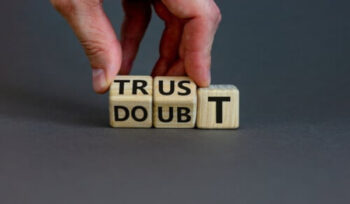By Lissa Rankin
Guest writer for Wake Up World
People with relational trauma often have trust issues, and they can be a beast to deal with if you’re someone new in their life. People with a heavy trauma burden often have upside down compasses when it comes to knowing who to trust. Either they’re paranoid and trust nobody, no matter how trustworthy someone is, or they’re naive, gullible and overly trusting of dangerous, predatory, ruthless, exploitative, unsafe people.
[pro_ad_display_adzone id=”110028″]
They may trust untrustworthy people and distrust trustworthy people, which creates a vicious cycle that solidifies their distrust over time, since the untrustworthy people they put their trust in turn out to betray them, and they push away any trustworthy people they meet because of their incessant testing. It can create a painful catch-22 and be really legitimately confusing for these folks.
Honing one’s discernment is a key step in recovery, so learning how to test whether someone is trustworthy or not is a crucial skill. But many don’t know how to ethically test someone’s trustworthiness, so they test people in all kinds of painful, even cruel ways, setting them up to disappoint (and reinforcing their distrust) rather than giving someone new a clear path to pass the test and then having a reasonable time frame within which the discernment takes place, after which, you can both relax into a reasonably trusting, safe relationship.
It’s appropriate to test new people to see whether they’re trustworthy, but there are healthy ways to do this and unhealthy ways.
Unhealthy Ways To Test For Trustworthiness
Let’s talk about the unhealthy ways first. There’s the passive aggressive way, in which you:
- Behave badly
- Cross someone’s boundaries repetitively
- Lie or withhold or fail to tell someone the whole truth
- Act out and have a tantrum when you don’t get what you want
- Push someone away
- Say yes when you mean no and then punish someone
- Withhold what you know the other person wants just to see how they react
- Play the “come close, then go away” mind game
- Set up a test without letting someone know what your expectations are
- Have vague standards or expectations you don’t communicate to set someone up for success
- Fail to communicate your needs, wants, and boundaries and expect someone to mind read instead
- Set up unrealistic expectations of sainthood or perfection and then scorn the other person when they turn out to be human
- Sabotage real intimacy in every way possible
Then you wait to see if they let you off the hook without protest- or leave. If they don’t protest much and they don’t leave, no matter how intolerable you are, then they pass the test.
That’s not healthy. That’s not testing, that’s torture. And it’s not fair or kind to the other person. In fact, someone who passes those kinds of tests is probably blended with martyr parts, codependent parts, spiritual bypassing parts, conflict avoidant parts, and other parts that tolerate abuse without protest and without walking away. It’s a set up for an unhealthy dynamic.
Healthy Ways To Test For Trustworthiness
But there’s a healthy way to test whether someone is trustworthy.
- You set clear boundaries and see if the other person can respect your boundaries, even if they don’t particularly like them
- You say no when you mean no and see how someone responds when they don’t get what they want from you
- When someone says yes, you track whether their yes is a real yes and whether they follow through on their yes in a timely fashion
- You negotiate agreements together and see whether the other person is capable of upholding mutually negotiated agreements in a mature way
- You pay attention to whether someone is being transparent about their motives, looking out for possible hidden agendas and calling that out if you feel something is in the gray zone. If people have an agenda or are trying to transact with you, trustworthy people will be willing to name what they want and respect your no if you don’t want to participate in the transaction. Untrustworthy people will likely get triggered and act out or deny and gaslight you or withdraw if you’re onto their hidden agenda and name it out loud.
- If you catch someone in a lie, you confront that person to understand why they’re lying or withholding something you have a right to know
- You pay attention to whether someone respects your time boundaries or leaves you waiting much of the time
- You notice the way they talk to you and about you in front of other people. Are they cherishing or insulting, lifting you up or demeaning you?
- You observe how they treat people. Do they humanize everyone equally or do they suck up to people they want to impress and dehumanize or ignore or act entitled with people they feel superior to?
- You Google search them and see if what they say is verifiable. If they say they’re a CEO at a company, is there a webpage for the company proving that? Is there public evidence of lawsuits, fraud, scandals, or a criminal record? Will they give you references you can check? It’s not paranoid to do some due diligence when you’re meeting someone new, especially if they’re spouting a lot of grandiose claims
- You notice how they talk about ex-lovers, ex-friends, ex-business partners. If they’re always the victim and everyone else is always the perpetrator, you can be sure you’ll be the next perpetrator in the story they tell the next person about you.
While it’s wise to test new people for a while, it’s kind to set someone up for success. Rather than testing them indefinitely and never letting them earn your trust, you need to know what it takes to determine whether someone is trustworthy enough to meet your standards, and quit testing them beyond that threshold. That doesn’t mean you won’t change your mind about them if they do something to betray your trust. But if you don’t let someone ever relax into feeling trusted by you, healthy people will give up on you at some point, and that’s a sad loss, since trustworthy, securely attached people can be a real gift to people with trust issues.
Consider the people in your life. Who do you trust? Who are you still not sure about? What is your strategy for determining whether new people are deserving of your trust?
Originally published at LissaRankin.com and reproduced here with permission.
About the author:
 Lissa Rankin, MD is a mind-body medicine physician on a grass roots mission to heal healthcare, while empowering you to heal yourself. She is the founder of the Whole Health Medicine Institute training program for physicians and healthcare providers, and the New York Times bestselling author of the books Mind Over Medicine: Scientific Proof That You Can Heal Yourself (2013), The Fear Cure (2014), and The Anatomy of a Calling (2015).
Lissa Rankin, MD is a mind-body medicine physician on a grass roots mission to heal healthcare, while empowering you to heal yourself. She is the founder of the Whole Health Medicine Institute training program for physicians and healthcare providers, and the New York Times bestselling author of the books Mind Over Medicine: Scientific Proof That You Can Heal Yourself (2013), The Fear Cure (2014), and The Anatomy of a Calling (2015).
Lissa blogs at LissaRankin.com and created the online community HealHealthCareNow.com. She is also the author of several other books, a speaker, a professional artist, an amateur ski bum, and an avid hiker. She lives in the San Francisco Bay area.
Connect with Lissa on Facebook and Twitter, or visit LissaRankin.com.
[pro_ad_display_adzone id=”110027″]








